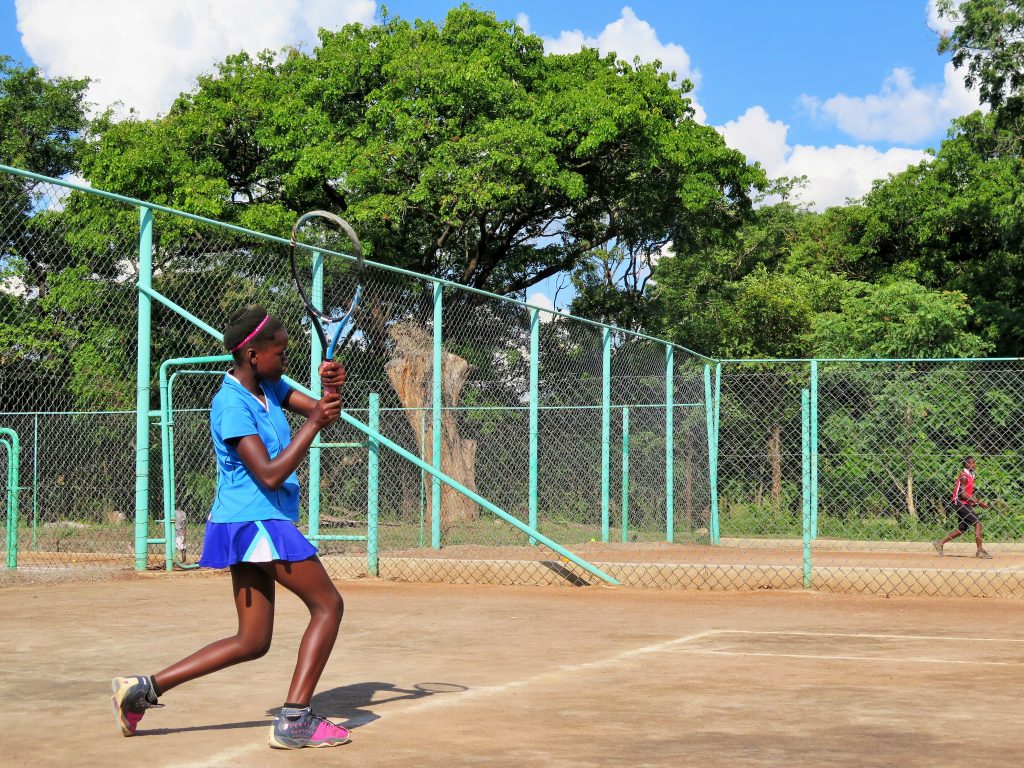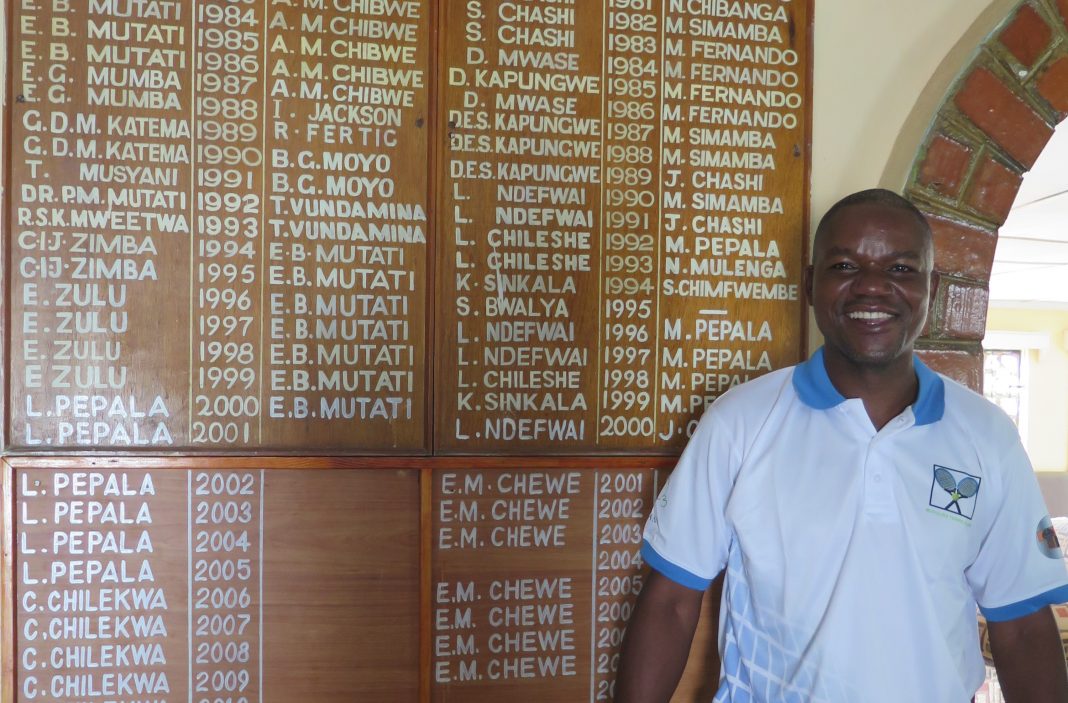Emmanuel Chewe was forbidden from playing tennis as a boy, but ended up becoming champion of Mufulira Tennis Club for eleven years running. Tennis gave him all kinds of opportunities – it sent him around the world – so when he saw the sport dying a slow death in his hometown, he just had to do something about it.
We sat down to hear his story.
You started playing tennis as an 11-year-old boy, but you kept it secret from your parents. Why?
Basically, our parents didn’t allow us to play tennis. So I used to sneak out to go and watch tennis. They thought that if you concentrate on sport then you won’t be educated.
I started playing tennis at Kantanshi Academy when I was 11. My parents didn’t know anything! By age 14, I was playing a lot of junior international tournaments. The first tournament I played, my parents didn’t know that I’d even gone out of town.
Where did you go?
To Kitwe. It was my first tournament, and I reached the quarterfinals. The second tournament was quite tricky because it was very far away – it was in Lusaka. So I had no choice but to tell them.
By age 14, I was playing a lot of junior international tournaments. The first tournament I played, my parents didn’t know that I’d even gone out of town.
What did they say?
They said: “Lusaka? It’s very far away!” I told my parents that ZCCM [Zambia Consolidated Copper Mines] was going to sponsor the trip. Some friends came to my house and said “Let him go, he’s a good player…” They said “Okay, you can go. But please take care.”
And guess what? From there, I reached the finals in Lusaka. And I came home with a prize: a trophy, and some jeans, and books…
Emmanuel chuckles with delight.
How did your tennis career develop after that?
I started coaching when I was about 20. At 18, you stop playing junior tournaments, so you go into coaching. We were doing both, you know – playing and coaching. I was playing professional tennis from age 21; I went to Tanzania to play.
What happened to Kantanshi Academy?
You know, just after privatisation [in 1999], it was very tricky. There was no sponsorship, and the academy really went down. People were not interested in sports. In 2001, tennis literally died here. It died… most of my friends went to the United States. Lyton Ndefwayi and Sydney Bwalya [celebrated Zambian tennis players] were in the States… I was alone coaching in Mufulira.
When did things start to improve?
I started organising the kids and playing tennis with them – just for fun. And, you know, the funny thing is, I started with my family. I started playing tennis with my two daughters and the neighbours’ children. But we didn’t have equipment, so I asked my friend Sydney. I said, “Look here, you guys went to the States because of tennis. And now this sport is dead in Mufulira. Can’t you send some stuff so I can keep coaching the kids?” And that’s how we did it.
Sydney Bwalya and some friends formed an organisation called Love 40, and they sent an initial shipment of 12 rackets and 18 t-shirts to Mufulira.
When did Mopani Copper Mines Plc get involved?
In around 2015. Do you know what happened? Barry Hodgkinson [Mopani’s Chief Officer – Business Improvements] often passed through, and he noticed all the kids. One day, he came here and asked us, “How do these kids manage to practice here? I’ve seen the courts… How do you manage to practice on these surfaces?”
“This is how we survive,” I told Barry.
After the privatisation of the mines, there was no sponsorship. So, maintaining the courts was very difficult. It was true: there were no courts here anymore – it was all grown over with grass. There was nothing. We only had one net!
So Barry approached us and said, “I think we can do something for these kids.”
Just two days later he came with road graders.
They started removing the grass, they resurfaced the courts… The club started to change again!
It wouldn’t have happened if it weren’t for your passion.
I tell you: it was really wonderful! From there, we started playing tournaments. These kids were winning – from the Under 10s to the Under 18s. Barry was very impressed by their results. That’s when he said, “I think these kids are doing very well. Why don’t we send them to compete internationally?”
Lyton Ndefwayi [another coach at the club] and I chose a tournament in Namibia in 2015, and sent eight kids to play. The kids reached the second round, and Natasha Chewe [the current female Club Champion] reached the third round.

How long had Natasha been training with you?
She started playing tennis here with me when she was about seven [five years ago]. There were just a few kids when I was coaching at that time, and she used to come with her older sister. Now she practices three times a week in the afternoons, for two hours.
She’s doing very well. She reached the quarter finals in Mauritius [in 2018], and she’s also competed in tournaments in Namibia, Zimbabwe, and Botswana. If she can play more international tournaments, she has a good chance of playing professional tennis.
Who sponsored the kids at these tournaments?
That was Mopani, everything was funded by Mopani.
Apart from improved tennis skills, have you noticed any changes in your students over the years?
I tell you, these children’s mentalities have changed, you know. As a club that also sponsors their schooling, we really see their behaviour changing. These children are very disciplined. They go to school, from school they come and play tennis, and they go home early. Many other children at their age start drinking alcohol at this stage, not them …
How do you find time to coach tennis and work a full-time job?
This is my 19th year at Mopani. Actually, my supervisors and my boss have been very good to me. They always give me permission to come and coach when I need to. Most of the time – especially on Thursdays and Fridays – I do the morning shift. So, straight after work, I come to the tennis club.
Tennis is where my heart is. When I’m working or doing something else, it’s like I’m missing something. But as soon as I come to tennis, I’m complete.
See also: Poverty no handicap for young golfers























